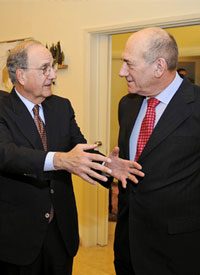
The State Department said that Mitchell’s visit in Israel is part of an eight-day tour that includes stops in Egypt, the West Bank, Jordan, and Saudi Arabia.
Mitchell met in Tel Aviv with Israel Defense Forces Chief of Staff Lt. Gen. Gabi Ashkenazi. A statement issued by the Israel Defense Forces and quoted by CNN said the two talked about the "main points" of Israeli security operations in the West Bank and the "goals of the recent Israeli operation in Gaza. In addition, they discussed the security challenges faced by the IDF and Israel, the strategic situation in the Middle East and the need to face the global threat of terror." The statement also noted that Ashkenazi "praised the strategic and security cooperation and relationship between the United States and Israel and wished Mr. Mitchell luck in his mission to the region."
During his visit to Israel, Prime Minister Olmert told Mitchell that the cease-fire between Israel and Gaza would hold only if Hamas, which controls Gaza, stops smuggling weapons into Gaza and halts rocket fire into Israel.
Israeli political opposition leader Benjamin Netanyahu, who is a favorite in opinion polls to become prime minister in upcoming elections, was pessimistic about the prospects of a lasting peace, telling Israeli Radio: "Its clear Hamas is rearming. Of course it’s attacking us. Of course it’s trying us. The next government will have no choice but to finish the work and remove the Iranian terror base for good."
On January 29, Mitchell visited the West Bank for a meeting with Abbas, the Fatah party leader and president of the Palestinian National Authority that abandoned Gaza when Hamas won elections in the coastal strip.
While in the West Bank, Mitchell addressed the situation in Gaza, stating: "To be successful in preventing the illicit traffic of arms into Gaza there must be a mechanism to allow the flow of legal goods, and that should be with the participation of the Palestinian Authority. Lasting peace is our objective and the United States will sustain an active commitment to reaching the goal of two states living side by side in peace, stability and security."
Under a 2005 agreement brokered by the United States, the Palestinian Authority was given a role to help monitor border crossings, but Hamas was not. When Hamas took control of Gaza in 2007, the Palestinian Authority forces were forced to withdraw, and Israel imposed a strict economic embargo on Gaza, permitting only humanitarian aid and basic supplies to be brought across the border.
As Mitchell visited the region, breaks in the ceasefire struck on January 18 continued. Reuters news service reported that Hamas militants launched one rocket from Gaza into Israel on January 28 and another the next day. In retaliation, Israeli aircraft fired on targets in the town of Khan Younis in southern Gaza. Casualties were light, and there were no fatalities.
"As the sole authority in the Gaza Strip, Hamas bears full responsibility for all terrorist activity originating from Gaza," said an Israeli military statement.
As Mr. Mitchell’s tour of the troubled area continued, UN Secretary-General Ban Ki-moon, who was in Davos, Switzerland, to address the World Economic Forum, called for $613 million to help people impacted by the ongoing crisis in Gaza. BBC news quoted Ban as saying:
More than one-third of the 6,600 deaths and injured were children and women. As a father of three I was especially troubled by the suffering and trauma that so many families went through. People have lost their families, they have lost their homes, belongings, and livelihoods. Schools, clinics, factories and businesses have been destroyed.
John Holms, the chief of the UN Office for the Co-ordination of Humanitarian Affairs, who was also in Davos, said at a joint news conference with Secretary-General Ban that Israel must lift its blockade of Gaza:
We’re asking for the crossing points to be opened fully… Otherwise, we won’t be able to achieve what we want to achieve.
The grave humanitarian crisis in Gaza, where almost 1.5 million people are packed into a tiny area of 139 square miles, can be viewed as a logical consequence of the victory of the Hamas terrorist organization in the January 2006 parliamentary elections and the subsequent triumph of Hamas over its more moderate Palestinian opponent, Fatah, in the June 2007 Palestinian Civil War. By unwittingly bringing to power a rogue regime unwilling to adhere to peaceful relations with larger, and more powerful, Israel, 42.8 percent of Gaza’s voters (the plurality) placed themselves and their neighbors in the position of becoming residents of a perpetual battlefield. Unfortunately, the most vulnerable citizens of Gaza have borne the brunt of the effects of those unwise choices.
Photo: AP Images



